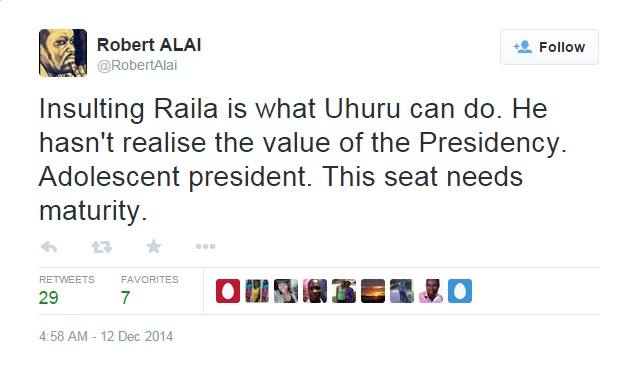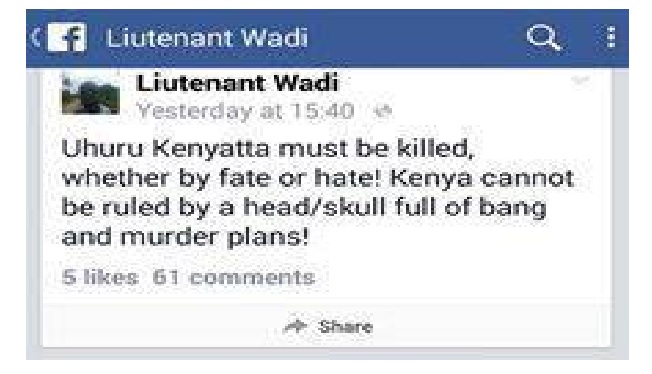The Penal Code & Social Media in Kenya: Criminal Liability for Undermining Authority of Public Officer
- Victor Nzomo |
- January 2, 2015 |
- CIPIT Insights,
- Social Media and the Law

Recently, this blogger has come across two cases of social media users in Kenya being arrested, detained and charged in criminal court for their tweets and/or facebook posts. In the case of one Robert Alai, media reports indicate that Alai was arrested and arraigned before Kiambu Principal Magistrate and charged with intention to undermine the authority of the President of Kenya contrary to section 132 of the Penal Code. According to the charge, it was alleged that on December 13, 2014 at an unknown place within the Republic of Kenya, Alai without lawful excuse published a message on Twitter that undermined the presidency. The tweet in question has been reproduced above which reads:
‘Insulting Raila is what Uhuru can do’. ‘He hasn’t realised the value of the presidency’. ‘Adolescent President’. ‘This seat needs maturity’
According to media reports, the prosecution had opposed Alai’s application for bail, terming the matter sensitive, and it touched on the President of the Republic, noting that once released, the accused may continue with the same publications. However the court agreed to grant him a bond noting that the case is still pending in court and Alai had a right to bail. Therefore the court ruled that Alai be released on a bond of Sh300,000 or cash of Sh200,000 pending hearing of the matter on April 16, 2015. It is reported that the court cautioned Alai on posting anything touching on the matter before court on Facebook, Twitter, WhatsApp or any other related social media platforms.

In the case of one Alan Wadi Okengo alias Lieutenant Wadi, media reports indicate that Wadi was sentenced to two years in prison after pleading guilty to charges of hate speech and undermining the authority of a public officer. Wadi, a Political Science student at Moi University, posted several offensive messages on his facebook page, including one which has been reproduced above.
According to media reports, Milimani Resident Magistrate Ann Kaguru made the following remarks while handing down the jail sentence:
“The offence is serious and a deterrent penalty is called for to serve as a warning to others abusing the social media forums.”
Generally, the Penal Code is a body of laws or codes, which gives a list of crimes and the punishments that accompany them. For instance, in Kenya’s Penal Code (Chapter 63 Laws of Kenya), the law on murder is under code 203 whereas in the US State of California murder is under code 187. The Penal Code in Kenya traces its history from colonial times commencing 1st August, 1930. Throughout its history, it has been amended to fit in new phenomena and the interests of the society it is meant to serve.
A cardinal rule of criminal responsibility under the Penal Code is stated under section 7 which reads that “ignorance of the law does not afford any excuse for act or omission…unless knowledge of the law by the offender is expressly to be an element of the offence.” Therefore it is imperative for all users of social media to familiarise themselves with the Penal Code.
In the present cases, Section 132 in the Penal Code reads as follows:
Any person who, without lawful excuse, the burden of proof whereof shall lie upon him, utters, prints, publishes any words, or does any act or thing, calculated to bring into contempt, or to excite defiance of or disobedience to, the lawful authority of a public officer or any class of public officers is guilty of an offence and is liable to imprisonment for a term not exceeding three years.
The Constitution of Kenya defines a “public officer” as “any State Officer or any person, other than a State Officer, who holds a public office”. This is a long list of officials, identical to the definition of “State Officer” which includes various categories of members in the three arms of government at both national and county levels.

Elizabeth Moturi (@ElizabethMoturi)
Je ne suis pas #CharlieHebdo | Diasporadical